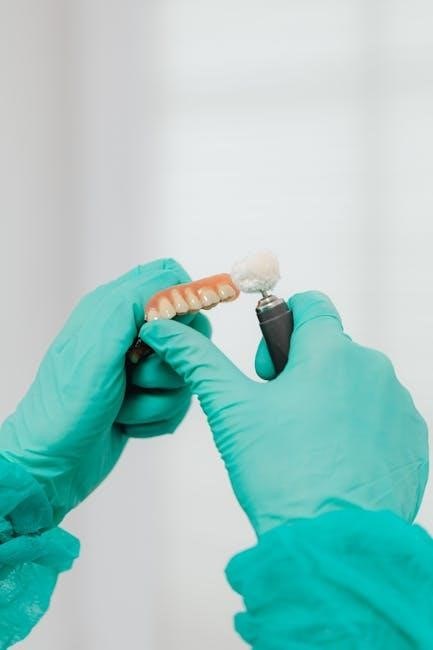
denture care instructions pdf
Proper denture care is essential for maintaining oral health and ensuring longevity․ Dentures replace missing teeth, restoring chewing ability and improving appearance․ Regular cleaning, soaking, and proper storage are crucial for keeping dentures functional and hygienic․ By following a daily routine and professional guidelines, you can enjoy a comfortable and healthy smile with your dentures․
Importance of Proper Denture Care
Proper denture care is vital for maintaining oral hygiene and preventing various dental issues․ Dentures, like natural teeth, accumulate bacteria, food particles, and plaque, which can lead to bad breath and infections if not cleaned regularly․ Regular cleaning prevents the buildup of these substances, ensuring fresh breath and reducing the risk of infections․ Additionally, dentures must be soaked overnight to maintain their shape and fit, preventing them from drying out and becoming uncomfortable or ineffective․ Proper care also prevents stains, keeping dentures looking clean and presentable․ Furthermore, maintaining denture hygiene supports overall oral health by preventing gum disease and decay in surrounding teeth․ Regular adjustments by a professional ensure a good fit, avoiding sore spots and irritation․ Proper care extends the lifespan of dentures, saving costs and hassle․ Lastly, clean and well-fitting dentures boost confidence, allowing individuals to speak and eat comfortably in social settings, enhancing their quality of life․
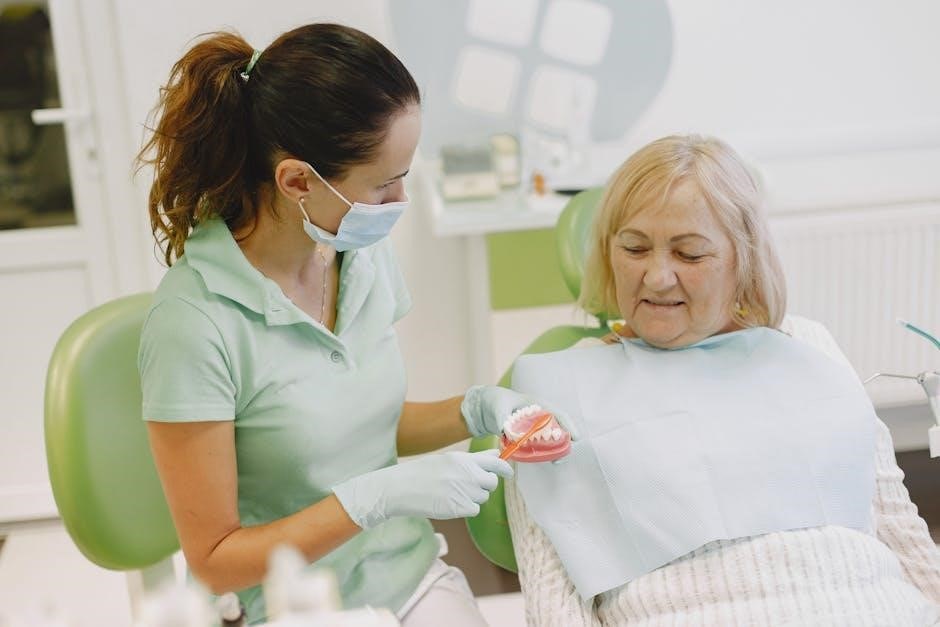
Daily Denture Cleaning Routine
Brush dentures daily with a soft-bristled toothbrush or denture brush using mild soap or denture cleaner․ Rinse thoroughly after meals and soak overnight to maintain hygiene and shape․
Brushing Techniques
Proper brushing is vital for maintaining denture hygiene․ Use a soft-bristled toothbrush or a denture brush to gently remove plaque and food particles․ Avoid using toothpaste, as it can be abrasive․ Instead, apply mild liquid soap, denture paste, or antibacterial hand soap․ Brush all surfaces, including the gums and tongue, to prevent irritation and infection․ Hold the brush at a 45-degree angle and use gentle circular motions․ Rinse thoroughly with cold water to remove any cleaning agents․ For stubborn stains, consider using an ultrasonic cleaner․ Always brush over a basin filled with water or a towel to prevent accidental damage if the dentures slip․ Regular brushing helps maintain a clean, functional, and comfortable smile․ Ensure this step is part of your daily routine for optimal denture care․
Rinsing After Meals

Rinsing your dentures after every meal is a simple yet crucial step in maintaining their cleanliness and preventing food particles from accumulating․ Use cold water to rinse thoroughly, as hot water may warp or damage the dentures․ Gently shake off excess water, but avoid scrubbing too hard, which could cause scratches․ For removable partial dentures, rinse the natural teeth and gums as well to maintain overall oral hygiene․ This practice helps prevent bad breath, stains, and potential infections․ If you plan to soak your dentures overnight, rinsing after meals ensures they are clean before soaking․ Make this a habit to keep your dentures in optimal condition and promote a healthy mouth environment․ Consistent rinsing complements daily brushing and soaking, ensuring your dentures remain functional and comfortable․
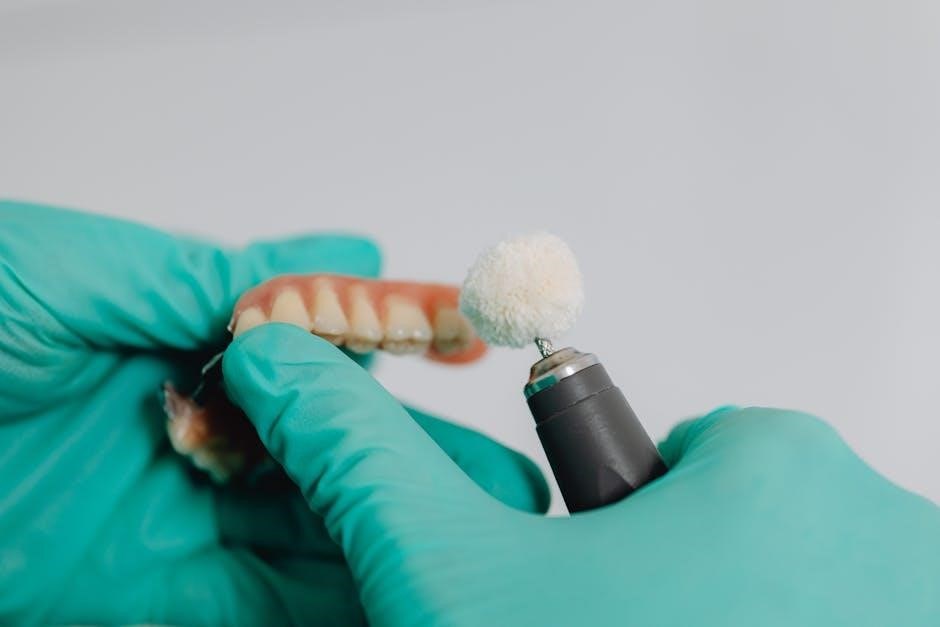
Overnight Denture Care
Soak dentures overnight in water or a mild denture-soaking solution to maintain their shape and hygiene․ Follow the manufacturer’s instructions for soaking solutions to ensure proper care․
Soaking Dentures
Soaking dentures overnight is crucial for maintaining their shape and hygiene․ Submerge them in water or a mild denture-soaking solution to keep them moist and clean․ This practice helps prevent warping and ensures they remain comfortable․ Always follow the manufacturer’s instructions for soaking solutions to avoid damage․ Denture cleaners or antibacterial soaps can be effective, but rinse thoroughly before reinserting to remove any chemical residue․ Soaking also helps remove stubborn plaque and stains, ensuring your dentures stay fresh and functional․ Regular soaking is a simple yet essential step in your daily denture care routine to maintain oral health and extend the lifespan of your dentures․
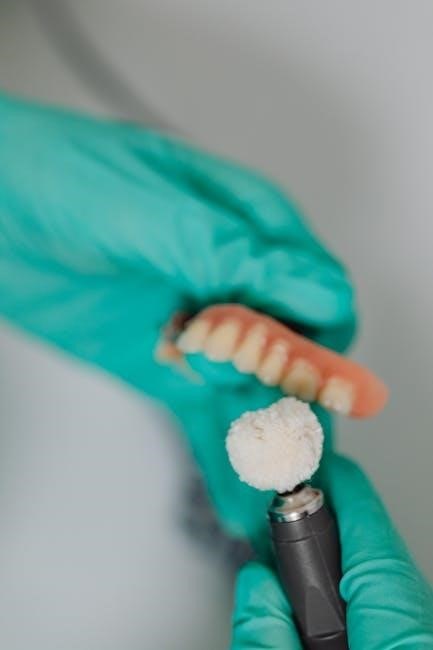
Morning Rinse
A morning rinse is a vital step in maintaining denture hygiene․ After soaking your dentures overnight, rinse them thoroughly with cold water to remove any residual cleaning solution or debris․ This ensures your dentures are clean and ready for use․ Gently shake off excess water and pat dry with a soft cloth to prevent water spots․ Rinsing helps maintain freshness and prevents the accumulation of bacteria․ Always rinse your dentures before reinserting them to ensure a clean and comfortable fit․ This simple step complements your overnight soaking routine and daily brushing, promoting optimal oral health and extending the lifespan of your dentures․ By incorporating a morning rinse into your care routine, you can enjoy a fresh, clean smile every day․

Handling and Storing Dentures
Always handle dentures with care to avoid damage․ Store them in a protective case or water when not in use․ Use a soft cloth to prevent scratches and ensure they remain clean and secure․
Safe Storage
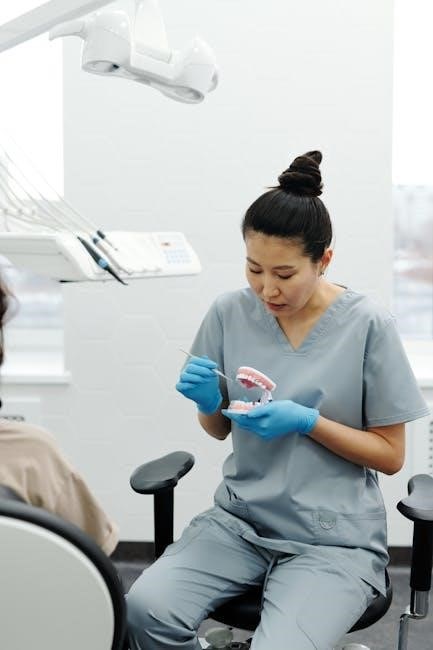
Proper storage is crucial to maintain the integrity and hygiene of your dentures․ Always keep them in a protective case when not in use to prevent scratches or breaks․ Moisturizing is key, so submerge dentures in water or a mild soaking solution overnight․ Avoid using hot water, as it may warp the material․ Never store dentures in tissues or exposed to air, as this can cause them to dry out and lose shape․ Clean dentures thoroughly before storage to remove bacteria and food particles․ Use a soft cloth to pat them dry, but avoid harsh chemicals or abrasive materials that could damage the surface․ By following these steps, you ensure your dentures remain clean, secure, and functional for years to come․
Transportation Tips
When transporting dentures, use a sturdy, ventilated container to protect them from damage․ Moisturize dentures with water or a soaking solution before placing them in the case․ Avoid wrapping them in tissues, as this can cause scratches or breaks․ Instead, use a soft cloth to cushion them during travel․ Ensure the container is secure and won’t open accidentally․ Keep dentures away from extreme temperatures or direct sunlight, which can warp the material․ If flying, store dentures in a carry-on bag to prevent loss or damage․ Always rinse dentures with water before reinserting them after travel․ By taking these precautions, you can safely transport your dentures and maintain their condition․ Proper handling ensures they remain functional and comfortable for years to come․

Maintaining Denture Hygiene
Thoroughly clean dentures daily with a soft-bristled brush and mild soap to remove plaque and bacteria․ Regular rinsing and soaking help prevent infections and maintain hygiene․ Professional inspections ensure optimal fit and health․
Professional Check-Ups
Regular dental check-ups are vital for maintaining denture health and overall oral well-being․ Even with proper home care, professional inspections ensure optimal fit and functionality․ Dentists can identify early signs of wear, misalignment, or gum changes that may require adjustments․ During these visits, your dentist will also clean areas beneath the denture that are hard to reach, preventing plaque buildup and potential infections․ Additionally, they can address any discomfort or sore spots caused by ill-fitting dentures․ Professional check-ups help prevent complications like gum irritation or bone loss, ensuring your dentures remain comfortable and functional for years․ By scheduling regular appointments, you can maintain a healthy smile and extend the lifespan of your dentures․
Adjustments and Repairs
Over time, dentures may require adjustments or repairs to ensure proper fit and function․ As gums and bones change, dentures can become loose, leading to discomfort or difficulty chewing․ Signs that adjustments are needed include sore spots, uneven bite, or movement while eating․ Only a dental professional should make these adjustments, as improper changes can cause further issues․ Repairs, such as fixing cracks or replacing broken teeth, should also be handled by a dentist to maintain the integrity of the denture․ Regular check-ups can help identify these needs early, preventing more extensive damage․ Additionally, using a denture adhesive can provide temporary relief for minor fit issues․ Always avoid attempting repairs at home, as this can damage the denture beyond professional repair․ Timely adjustments and repairs ensure continued comfort and functionality of your dentures․

Common Issues and Solutions
Common denture issues include loose fit, sore spots, and staining․ Solutions involve timely dental check-ups, proper cleaning, and using recommended products to maintain comfort and hygiene․
Spotting Problems Early
Spotting issues early is crucial for maintaining denture comfort and function․ Look for signs like loose fit, sore spots, or uneven bite, which may indicate adjustments are needed․ Staining, odors, or cracks should be addressed promptly to prevent further damage․ If you notice difficulty chewing, gum irritation, or discomfort, consult your dentist․ Regular inspections can help identify worn-out areas or misalignment․ Ignoring these signs can lead to more severe problems, such as gum inflammation or denture breakage․ Early detection ensures timely solutions, preventing costly repairs or health complications․ By monitoring your dentures and oral health, you can enjoy long-term comfort and functionality․
Troubleshooting Common Concerns
Common issues with dentures can often be resolved with simple adjustments or proper care․ If your dentures feel loose, check for worn-out linings or gum changes․ Sore spots may develop due to pressure points, which can be smoothed by a dentist․ For staining or discoloration, use a denture cleaner as directed․ If dentures click when speaking, adjust your speaking habits or consult your dentist․ Gagging can occur if dentures extend too far back; trimming may be necessary․ Persistent odor despite proper cleaning may indicate bacteria buildup, requiring a deep clean․ Difficulty chewing can improve with practice, but misalignment may need professional adjustment․ Addressing these concerns early prevents discomfort and ensures optimal performance of your dentures․ Regular check-ups are key to resolving issues before they escalate․
To ensure the longevity of your dentures, consistent and proper care is essential․ Regularly clean and soak your dentures to maintain hygiene and shape․ Use recommended denture cleaners or mild soap solutions, avoiding abrasive materials․ Rinse thoroughly after meals and before soaking to remove food particles․ Store dentures in water or a soaking solution overnight to keep them moist and well-fitted․ Handle dentures gently, using a soft-bristled brush for cleaning, and avoid harsh chemicals or hot water․ Regular dental check-ups are crucial for adjustments and to monitor oral health․ By following these best practices, you can extend the life of your dentures, maintain comfort, and enjoy a healthy, confident smile for years to come․